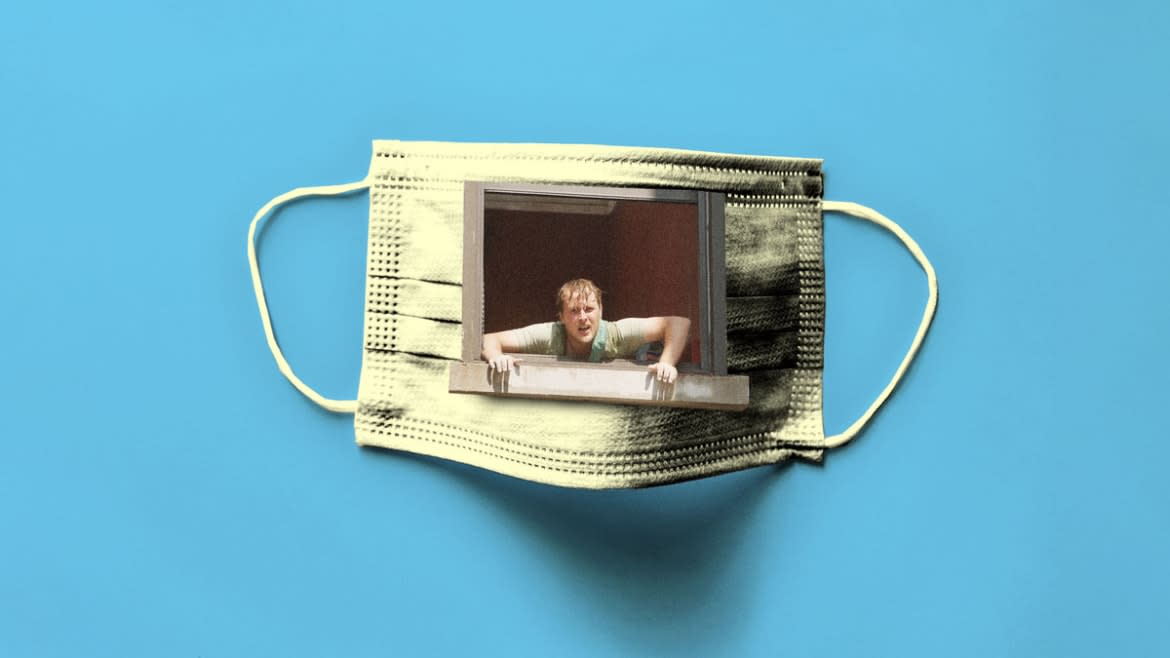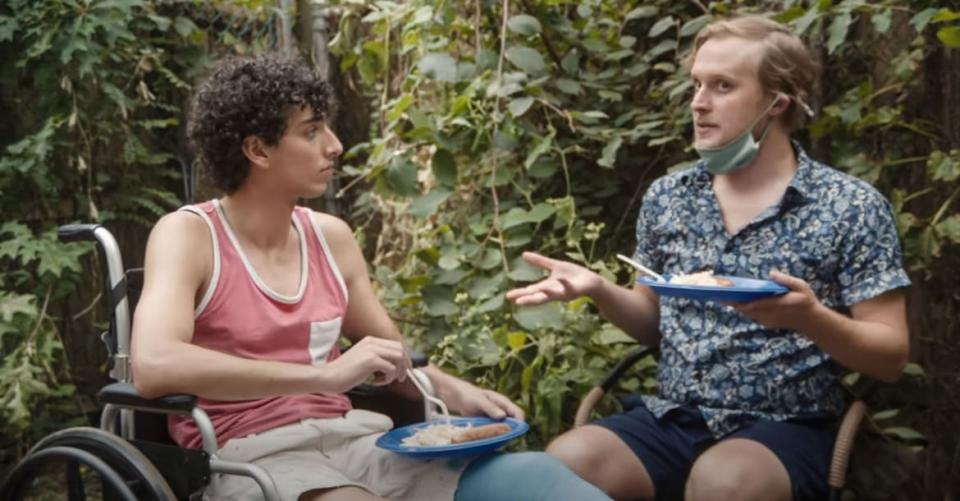‘Stress Positions’ Recaptures Peak COVID-Era Anarchy in NYC

Is this a safe space for a confession?
Well, thank you. Just between you and me: I never banged a pot or clanged a pan during the pandemic. I did not once go up to my rooftop, nor stick my head out the window, to slam two pieces of metal cookware together so that the brave—and I don’t use that word sarcastically—health care workers might hear it and feel celebrated from afar. It’s not that I think the show of appreciation and solidarity was corny, or that I didn’t agree with the sentiment. I was just too preoccupied with stewing in my own psychological ruin. Every day was already spent worrying about masking, the health and safety of my family and friends, wiping down groceries (which I did for far longer than I ever needed to), and a litany of other microscopic inconveniences that had been completely unimaginable just weeks before March 2020.
And, on top of that, I was expected to fuck up my cookware every night at 7 p.m.? Not a chance.
In the film Stress Positions, when a similarly embattled John Early reluctantly sticks his head out of a window to bang pots and pans like the act is just another obligatory chore, I breathed a sigh of sweet relief. The film, which is out in limited release now and expands nationwide Friday, April 19, is acerbic and unflinchingly mean. Finally: a piece of media about the pandemic that has no intention of highlighting humanity’s resilience, or creating paltry drama about the strain of cabin fever. Rather, Stress Positions is brutally honest about how the pandemic turned people inward, and bore a collective, contrived sense of altruism that we all adapted as a necessity for survival.
The inverse of that was a complete rebellion, one exhibited by those who took an ambivalent approach to masking and wore the stress of the pandemic on their sleeve, using it as an excuse to ratchet up their ignorance. These two states of being might seem opposed, but they exist on different sides of the same coin. In retrospect, they are equally as obnoxious, and that’s what makes their accurate depiction in Stress Positions so hysterically funny. Four years ago, no one had a damn clue what to do with themselves. Our entire existence was in flux, and now that there is a safe enough distance from the worst of the pandemic, making some nasty fun out of that chaos is so cathartic.
‘Stress Positions’ Is the First Genuinely Funny COVID Period Piece
Throughout Stress Positions, director, star, and co-writer Theda Hammel—whose character, a trans woman named Karla, represents the ambivalent, lawless approach to the pandemic—toys with how much she can get away with. Her best friend Terry Goon (Early) lives across Brooklyn, practically squatting in his soon-to-be ex-husband’s brownstone, where Terry’s nephew Bahlul (Qaher Harhash) is cooped up in the basement with a broken leg. Terry flits around the place neurotically spraying aerosol sanitizer, putting on gas masks to hand tip his delivery drivers (which he also sprayed down), and doing everything he believes that he’s supposed to so he can be deemed a good person during the most nightmarish time. Hammel understands that neither Karla nor Terry are inherently correct in their approach to the pandemic, but she’s happy to skewer Terry’s covert narcissism as much as she is Karla’s overt arrogance.
Hammel’s film is a delightfully caustic button-pusher, both in narrative and style. Its frenetic handheld camerawork and jarring New York City soundscape are bound to generate a hostile response from some viewers. But Hammel is not an edgelord; her film has no intention of being vexing just for vexation’s sake. Instead, she crafts a film that is keenly reminiscent of such a distinct window in time to allow viewers to empathize, however begrudgingly with both Terry and Karla.
Four years on, it’s easy to look back and allow ourselves some grace, we all deserve it. But it’s also perfectly fine to admit just how awful the pandemic was to our minds, and how none of us was exempt from being a little monstrous from time to time. I spent my viewing of the film—of which I watched a virtual screening in my living room as part of January’s Sundance Film Festival—wondering whether the ambulance sirens were coming from the movie or outside of my window. The memory of those frequent alarms, bouncing between buildings that dot crowded Brooklyn streets, still fills me with dread. Hearing them echo through the background of Stress Positions, as regularly as they occurred in real life, made me upset that I never allowed myself to be as candid in my nihilistic malaise as Karla is in the film.
Lily Gladstone Leaves You Breathless in ‘Under the Bridge’
There is, after all, no correct approach to handling an unprecedented worldwide event. Hammel’s film holds a mirror to how outrageous we acted, allowing us to watch the ways that we amplified our trauma in real time. Terry is so obsessed with doing everything right that he annoys and alienates his friends, causing himself to spin out of his mind. Make no mistake—Early’s performance is a sight to behold; his astute physical comedy and innate screen presence hold Stress Positions in place, and recall the classic screwball comedies of yore. But that manic delirium is no way to live. Karla’s honesty is far more attractive, even if it’s directly linked to a vapid air of self-importance.
At Terry’s Fourth of July backyard barbecue, Karla spends the event telling Bahlul that Fire Island is a place for the children of Sodom, and exchanges casually ignorant comments with Terry about the Middle East. We’re not meant to see her remarks as good or bad, correct or incorrect, only that they come from someone who has abandoned all nuance. Karla levels the disenfranchisement she’s experienced as a trans woman with the marginalization felt by others around the world, as if it’s one collective experience—much like the pandemic. She’s expressing how she feels, and there is value in that candor, because she doesn’t want to be exclusionary, only to use frank conversation as a way to understand the world a little bit better.

From left: Qaher Harhash, John Early.
Karla, of course, isn’t immune to being judged for her statements. Often, it seems as though she tries to push boundaries and perpetuate boldly false, problematic beliefs as her way of seeking connection in fraught times. Being steeped in this unease could even give way to someone educating her otherwise, should they have the confidence to challenge her. It’s like when Lena Dunham made an off-color comment about abortion in 2016, and gave one of the best, most memorable apologies in response to the immediate backlash. “My words were spoken from a sort of ‘delusional girl’ persona I often inhabit,” Dunham said, defining it as “a girl who careens between wisdom and ignorance.”
Hammel understands that it’s impossible to achieve the perfect social and political stance among cultural ruin and the dwindling cachet of youth, especially when the world is already crumbling. Why not be a little shit for once, or talk through an opinion until you’ve landed on some kernel of wisdom after spending an entire conversation defending yourself? Maybe that’s why we cling to the desire to be right: We want to achieve some semblance of goodness while staring down annihilation, and humans so often equate being right with being good.
For Terry, virtue comes from sanitizing surfaces and showing all of his friends just how staunchly he can follow the CDC’s instructions. Morality is his ticket to validation in the most precarious time of his life, left alone in a pandemic without a husband. But Karla can find morality in human connection; even if a pandemic adds a layer of danger, she doesn’t feel that her virtue is compromised by just trying to connect with her friends, flouting the societally imposed boundaries for her own sense of security.
Kirsten Dunst’s ‘Civil War’ Role Will Chill You to the Bone
When we’re looking down the barrel of worldwide destruction, why waste time subscribing to someone else’s perception of what is right or wrong? Maybe we should just make up that line ourselves to defy it all. So much of 2020 was spent chiding people who didn’t follow the newly set rules among the public, and often rightfully. But one thing we all learned during that period is that no experience was the same. When we stuck our heads outside to prattle a wooden spoon around a soup pot, nuance flew out the window too. Stress Positions is a great reminder that consideration and grace can—and should—look completely different depending on who they’re for.
Get the Daily Beast's biggest scoops and scandals delivered right to your inbox. Sign up now.
Stay informed and gain unlimited access to the Daily Beast's unmatched reporting. Subscribe now.


